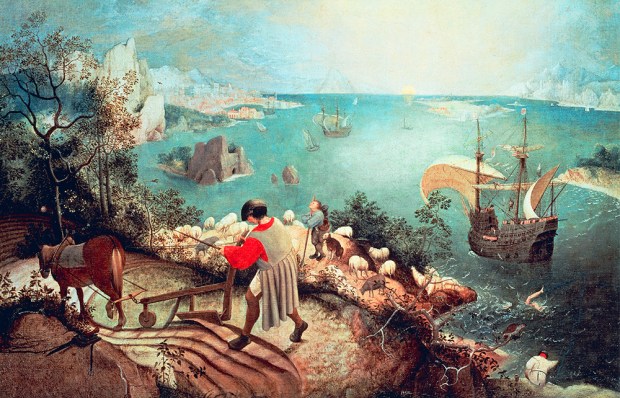In Competition No. 3164 you were invited to submit a poem in which each line comes from a different well-known poem.
The cento form — the stitching together of lines from existing poems — is an ancient one, around since at least the days of Virgil and Homer. ‘Cento Nuptialis’, by the Roman poet and teacher Decimus Magnus Ausonius, is a whopping 131-liner, composed of lines, or half-lines, from Virgil’s Aeneid, Georgics and Eclogue.
You were required to cobble together a mere 16 lines (or fewer if you chose), but the challenge, obviously, was to avoid sliding into nonsense. It was an accomplished entry — many of you chose to mine the same poetic seams — and once again, there was a welcome sprinkling of new names among the regulars.
Commendations go to Philip Roe, Avril Bradley, Jayne Osborn, Nick Syrett, Maggie McLean and Georgia Faloone. The winners, printed below, are rewarded with £25 each.
I met a lady in the meads,
Lying robed in snowy white
Her robe ungirt from clasp to hem,
And I was filled with such delight
She put my arm about her waist;
The sighs she heaved were soft and low;
We like sepulchral statues lay
Into the yellow evening glow.
I never saw so sweet a face.
I ne’er shall see its likeness more.
Under the Judas-coloured sun
She sucked until her lips were sore.
Her beauty fed my common earth
With apple blossom in her hair,
Where rivulets dance their wayward round;
My heart goes back to wander there.
Max Ross
Begin, and cease, and then again begin:
When I have crossed the bar
And stooped and drank a little more
And the wine that tasted of the tar
With beaded bubbles winking at the brim
But colourless, colourless —
It was evening all afternoon,
A tender hazy brightness:
How? Where? What matter? Somewhere in a dream,
With monstrous head and sickening cry
There came from me a sigh of pain:
I am sick, I must die.
I have been laughing, I have been carousing
In various bogus Tudor bars
Dreaming of terrifying monsters
Far beyond the stars.
Bill Greenwell
It is a beauteous evening, calm and free.
I see the boys of summer in their ruin.
When I have fears that I may cease to be,
The world is too much with us, late and soon.
If music be the food of love, play on.
They flee from me that sometime did me seek.
I cannot tell what loves have come and gone.
I’d have them sing in chorus, cheek to cheek.
When, in disgrace with fortune and men’s eyes,
From fairest creatures we desire increase.
But feel the strange heart beating where it lies!
Let all who prate of beauty hold their peace.
Time does not bring relief; you all have lied
That I shall never look upon thee more.
Ere half my days, in this dark world and wide,
I shall go back again to the bleak shore.
Robert Schechter
Where is the world we roved, Ned Bunn?
And Marion, cow-eyed,
The lovely Mary Morison
Wearing white for Easter-tide?
The sort of girl I like to see
And willows, willow-herb and grass?
And is there honey still for tea?
Stop here, or gently pass!
Jerome Betts
The bees are stirring — birds are on the wing —
Darkly I gaze into the days ahead.
A little learning is a dangerous thing.
I weep for Adonais — he is dead!
Love is not all: it is not meat nor drink.
I shall not look upon his like again
Till love and fame to nothingness do sink
And justify the ways of God to men.
Something there is that doesn’t love a wall,
Some heart once pregnant with celestial fire,
For you and me, exceedingly too small
To grasp this sorry Scheme of Things entire.
It stands plain as a wardrobe, what we know
When, his pulse failing, Passion speechless lies.
I learn by going where I have to go,
As to go naked is the best disguise.
Chris O’Carroll
I wander in the ways of men
But at my back I always hear,
‘Gather ye rosebuds while ye may
And pluck till time and times are done!
Who knows but the world may end tonight,
We have no time to stand and stare.’
They are not long, the days of wine and roses;}
Well they are gone and here must I remain.
Now it is autumn and the falling fruit,
When yellow leaves, or none, or few, do hang.
Not to go back is somewhat to advance
And totter on in bus’ness to the last.
W.J. Webster
No. 3167: lead alert
You are invited to submit a rhymed poem that is leadenly prosaic in tone and content. Please email entries of up to 16 lines to lucy@spectator.co.uk by midday on 16 September. NB. We are unable to accept postal entries for the moment.
Got something to add? Join the discussion and comment below.
Get 10 issues for just $10
Subscribe to The Spectator Australia today for the next 10 magazine issues, plus full online access, for just $10.
You might disagree with half of it, but you’ll enjoy reading all of it. Try your first month for free, then just $2 a week for the remainder of your first year.














Comments
Don't miss out
Join the conversation with other Spectator Australia readers. Subscribe to leave a comment.
SUBSCRIBEAlready a subscriber? Log in